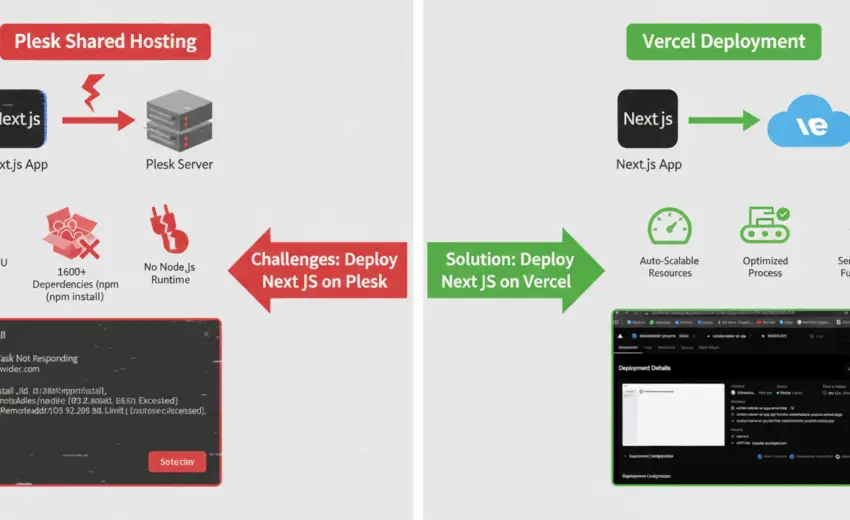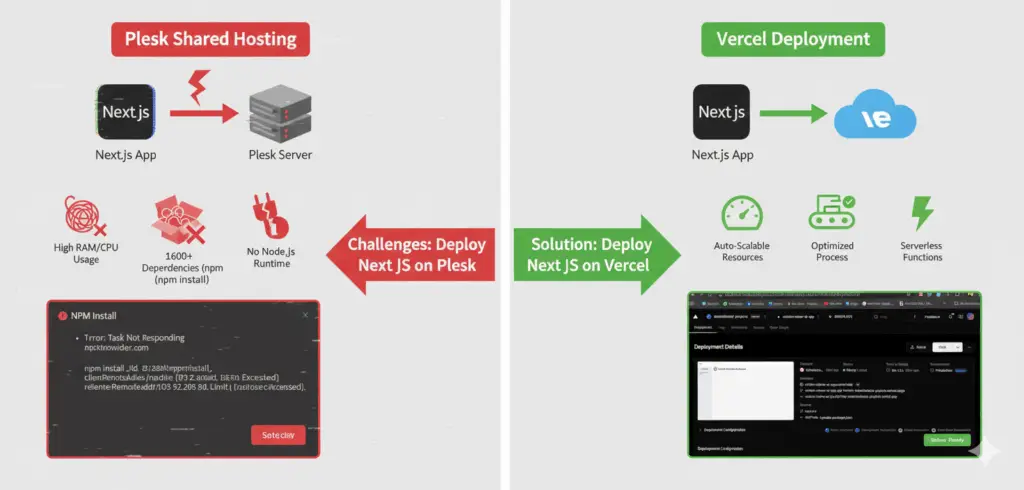
Table of Contents
Trying to deploy Next.js on Plesk shared hosting can feel like an impossible task.
You’ve built a stunning, modern application using the latest tech, but when you move it to your trusty Plesk server… it crashes. The server becomes unresponsive, and you’re left with nothing but errors.
You’re not alone. I recently went through this exact struggle with my AI-powered Notion Clone. My attempts to deploy Next.js on Plesk made my shared hosting completely inaccessible twice just from running npm install. That frustration, however, led to a breakthrough: a seamless, successful deployment on Vercel.which you can see live right here: https://notion-clone-ai-g2v967iqq-charlesbasis-projects.vercel.app.
This experience reveals a critical truth: modern JavaScript frameworks are not built for traditional shared hosting. This guide breaks down why it fails and provides proven methods to get your project online.

Why It’s So Hard to Deploy Next.js on Plesk
Plesk is a powerful tool, but it’s optimized for environments like PHP and WordPress. When it meets the demands of a Next.js build process, it simply can’t keep up. The keyword density for our topic, deploy Next.js on Plesk, is critical to understanding this friction.
Here’s the technical breakdown:
1. Extreme Resource Consumption (CPU & RAM)
The npm run build command is a resource hog. It uses tools like Webpack and TypeScript to compile and optimize your code, a process that can easily consume more RAM and CPU than your shared hosting plan allows. My project, with 1669 packages, was too much for the server, which is a common reason why you can’t deploy Next.js on Plesk directly.
2. Lack of a Persistent Node.js Environment
Modern Next.js apps require a server for features like Server-Side Rendering (SSR) and API Routes. Shared hosting is designed to serve static files, not run a persistent Node.js process. This is a fundamental incompatibility.
Your Step-by-Step Guide to Deploy Next.js on Plesk (The Static Way)
While a dynamic deployment is off the table, you can use a powerful workaround. This involves converting your app into static HTML, CSS, and JavaScript files that Plesk can easily serve.
Step 1: Build Your App Locally
First, run the production build on your own computer, which has the necessary resources. Open your project terminal and run:
# Install dependencies (use this flag if you have peer dependency issues)
npm install --legacy-peer-deps
# Create a production build
npm run build2. Export to Static HTML/CSS/JS: If your app is compatible (no SSR or API routes that need a server), run the export command. This is a key feature in the official Next.js documentation.
npx next export- This will create an
out/folder containing your entire website as static files. - Upload to Plesk: Using the Plesk File Manager or FTP, upload the contents of the
out/folder to yourhttpdocsdirectory.
- Limitation: This only works for fully static sites. Any feature that relies on a Node.js server environment will not work.
Method 3: The Power-User’s Choice – A VPS 🚀
If you need full control and want to self-host a dynamic Next.js application, a Virtual Private Server (VPS) from providers like DigitalOcean, Linode, or AWS Lightsail is the way to go.
- How it works: You get a clean server instance. You are responsible for installing Node.js, setting up a process manager (like PM2), configuring a reverse proxy (like Nginx), and managing the server.
- Best for: Developers with server administration experience who need custom configurations.
Quick Comparison: Vercel vs. Plesk vs. VPS
| Hosting Type | Build/SSR Supported? | Static Export Supported? | Resource Limits | Ease of Use |
| Vercel/Netlify | Yes (Optimized) | Yes | High & Scalable | ✅ Easiest |
| Plesk Shared | No | Yes (If static only) | Very Low | Easy (for static) |
| VPS | Yes (Manual Setup) | Yes | You Control | demanding |
Frequently Asked Questions (FAQ)
Can I ever run a full dynamic Next.js app on shared hosting?
Almost certainly not. Shared hosting environments lack the dedicated resources and server runtime (persistent Node.js server) required for Next.js features like SSR and API Routes.
Why did u003ccodeu003enpm installu003c/codeu003e crash my Plesk server?
The u003ccodeu003enpm installu003c/codeu003e command can be very resource-intensive, especially with a large number of dependencies. It consumes significant RAM and CPU to resolve the dependency tree and write files to disk, which often exceeds the strict limits imposed on shared hosting accounts.
What’s the difference between u003ccodeu003enext buildu003c/codeu003e and u003ccodeu003enext exportu003c/codeu003e?
next build compiles your Next.js application for production, creating optimized code bundles and server-side logic in a u003ccodeu003e.nextu003c/codeu003e folder. next export is an additional step that takes the output of u003ccodeu003enext buildu003c/codeu003e and generates a purely static version of your site (HTML/CSS/JS files) that can be served without a Node.js server.
Is Vercel free?
Yes, Vercel has a very generous free u0022Hobbyu0022 plan that is perfect for personal projects, portfolios, and even small-scale applications. It includes automatic deployments from GitHub, analytics, and more.
Conclusion
While it’s tempting to use existing Plesk hosting for new projects, modern JavaScript applications have different needs. My journey of crashing my server twice taught me a valuable lesson: use the right tool for the job.
- For dynamic, full-featured Next.js applications, platforms like Vercel are the gold standard.
- If you’re committed to Plesk, you must limit your project to what can be achieved with a static export (
next export).
Stop fighting your hosting environment. By choosing a platform designed for modern development, you can save yourself hours of frustration and focus on what truly matters—building amazing applications.
Don’t forget to check out my other posts
https://www.cvhowlader.com/my-first-laravel-react-crud-app/
https://www.cvhowlader.com/lubuntu-vs-linux-mint-xfce-a-real-world-performance-battle-2025/
https://www.cvhowlader.com/the-digital-foundation-why-every-business-needs-a-domain-and-hosting/

